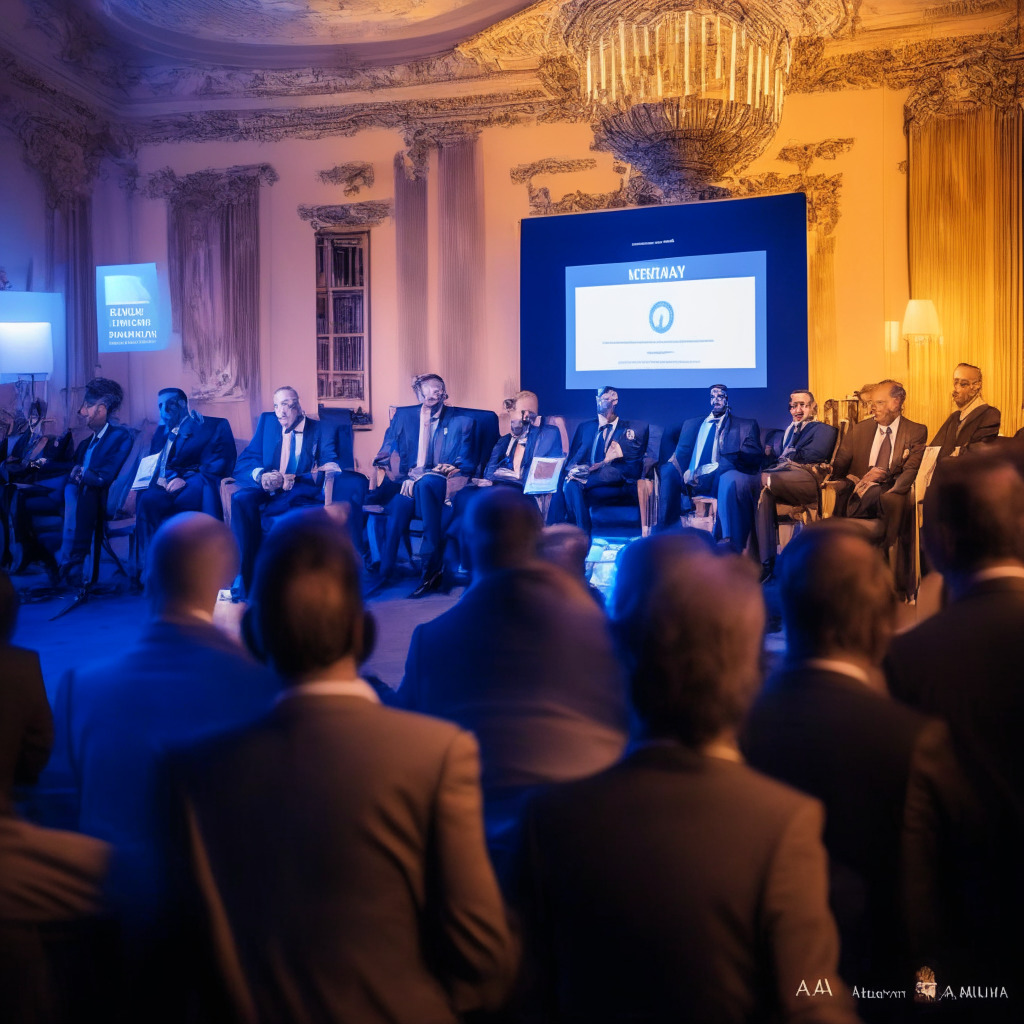Microsoft is recruiting a program manager for their nuclear technology initiatives, as part of their plan to harness AI and nuclear energy together. This move, while offering efficient energy consumption, brings up concerns due to its controversial and risky nature.
Search Results for: Microsoft
AI-Powered Solutions: Microsoft’s Quest for Convenience Versus Privacy and Cost Concerns
Microsoft has announced an AI-powered enhancement to its product range with features like language model integration. AI models for Bing will now deliver personalized results. However, rising costs and privacy concerns surrounding these developments are still to be addressed.
Morpheus: Microsoft and LeverFi’s AI Game-changer in Decentralized Finance World
“Microsoft and LeverFi are developing ‘Morpheus’, an AI assistant for portfolio management in the DeFi space. The tech incorporates two AI engines addressing protocol security and market failure, aiming to minimize portfolio losses while enhancing user confidence and control.”
Aptos Token Surge and Decline? The Microsoft Partnership vs the Looming Token Unlock
The APT token recently saw a 15% market price surge following news of a partnership with tech giant Microsoft but looming uncertainty remains due to the upcoming unlock of 2% of its supply, worth $33 million. Despite concerns about its tokenomics strategy, Aptos Labs is set to expand its product line with Microsoft’s advanced AI technology.
Aptos’ Token on High: The Microsoft Partnership, AI Blockchain, and the Journey to $100
The price of Aptos’s native token, APT, surged on news of a partnership with Microsoft for AI blockchain products. The collaboration will develop an AI-powered chatbot, the Aptos Assistant, to simplify smart contract and decentralized app development, as well as create blockchain-based financial products.
Aptos Labs and Microsoft Collaborate to Explore AI and Blockchain Synergy: Pros, Cons, and Complications
“Aptos Labs, a layer 1 blockchain initiated by ex-Facebook employees, plans to utilize Microsoft’s Artificial Intelligence to enhance its utilities, including the launch of an AI chatbot, Aptos Assistant. This move aims to democratize blockchain usage in the evolving Web3 world.”
Unraveling Microsoft Power BI: Navigating Benefits and Possible Pitfalls in Big Data Processing
“Microsoft Power BI is a sophisticated business intelligence tool that transforms raw data into communicative visualizations and reports. While offering significant benefits in business analytics and predictive algorithms, a misuse or misunderstanding can have serious implications, underscoring the need for solid data understanding.”
Ankr and Matter Labs Unite for zkSync Era Nodes on Microsoft Azure: A Major Blockchain Leap
Ankr and Matter Labs collaboratively launched zkSync Era Nodes and Hyperchain blockchain solutions on Microsoft Azure Marketplace, enhancing Ethereum’s Layer-2 scaling protocol. It enables businesses and Web3 projects to connect and build applications on zkSync Era, including bespoke blockchain application.
Bridging the Blockchain Gap: Axelar’s Ambitious Project with Microsoft’s Azure Cloud Structure
“Axelar is working on constructing a blockchain-anchored tool to bridge the gap between businesses, consumers, and decentralized applications using Microsoft’s Azure cloud structure. This potentially allows easier interoperability across different blockchain landscapes and automation of multichain deployments for Web3 products.”
Microsoft-CoreWeave Deal: The Growth of AI Tech and Its Impact on Blockchain and Crypto
Microsoft’s multi-billion-dollar deal with former Ethereum miner, CoreWeave, raises concerns in the crypto community while demonstrating the ability of blockchain-based firms to pivot towards new technology sectors, such as AI cloud computing and machine learning. This collaboration also highlights questions about AI tech’s impact and potential dangers of unchecked innovation.
Balancing AI Innovation and Regulation: Microsoft’s 5-Point Blueprint Explored
Microsoft President Brad Smith introduces a “5-point blueprint for governing AI,” emphasizing collaboration between public and private sectors. He proposes government-required licensing for advanced AI models, acknowledging that both sectors must work together to ensure AI serves society while addressing potential risks and maintaining ethical standards.
Microsoft President Urges AI Regulation: Balancing Innovation and Risk in a Transforming World
Microsoft President Brad Smith urges governments to regulate AI technology, addressing emerging concerns and uniting public and private sectors. He suggests licensing AI developers and holding companies accountable for managing disruptive technology, stressing the importance of balancing AI capabilities with mitigating potential risks.
Balancing Act: Innovation VS Privacy in Snapchat’s AI Chatbot Controversy
Snapchat’s AI chatbot “My AI” faces scrutiny from UK’s Information Commissioner’s Office due to potential privacy threats to users, including minors. The case highlights the struggle between leveraging tech breakthroughs and protecting user privacy in the hyperconnected social media landscape.
Gemini’s $24 Million Bet on India’s Potential as a Web3 Innovator: Motives and Challenges
Gemini’s APAC CEO and Global CTO, Pravjit Tiwana, highlights India’s potential as a key innovator in the Web3 arena, backed by a $24 million investment plan from Gemini. Tiwana cites India’s digital transformation history and unparalleled software development talent as factors for its potential leading role in shaping the Web3 landscape.
Advancing AI Capabilities: Google Bard’s Integration and the Privacy Paradox
Google’s move to integrate advanced, browser-based AI program Bard into Google Assistant could revolutionize user interaction. Bard harnesses the ability to undertake complex tasks like composing essays or codes, raising concerns about privacy imbalance. DBHelper
LinkedIn’s AI-Assistants Join the Recruitment Game: Revolutionary or Risky?
LinkedIn is incorporating AI into its operations to help recruiters and learners, despite skepticism about loss of human touch in such processes. Advocates argue that AI provides time-saving benefits and tailors content, with 74% LinkedIn users noting time savings after the introduction of AI-assisted messages when recruiting. The ongoing debate about AI’s pros and cons continues, but its growing incorporation into various industries is undeniable.
Zuckerberg’s Bet on AI for Meta’s Metaverse Dominance: Visionary Leap or Blind Hope?
Meta’s CEO, Mark Zuckerberg, highlighted the crucial role of AI in the development of the metaverse during a recent interview. By leveraging technology that integrates VR/AR and AI, Zuckerberg aims to establish Meta’s dominance in the 3D immersive metaverse. Despite financial setbacks, he remains committed to the metaverse vision, betting on Llama 2’s technology integration with Meta AI as their unique competitive edge.
Harnessing the Power of Tokenization: Future of Asset Management and The Uncertainties Ahead
“Tokenization, referring to the conversion of asset ownership rights into digital tokens on a blockchain, is revolutionizing securitization according to Jenny Johnson, CEO of Franklin Templeton. It opens up new possibilities for alternative investment vehicles with its incorporation of a payment mechanism, programmable smart contracts, and a source of truth embedded in a decentralized ledger.”
AI Market Saturation: An Ideal Breeding Ground for Innovation or an Overheating Bubble?
“The AI era differs fundamentally from its predecessors, displaying practicality and capacity to enhance multiple industries. Despite high valuations and growth, concern surrounds possible AI market overheating. Contrasting views argue market saturation serves as a birthplace for future innovations, thus ensuring industry advancement.”
Nvidia Raided by French Antitrust Agency: Unraveling the Implications for the Digital Industry
French authorities have raided Nvidia offices as part of a larger investigation into the cloud computing sector and potential anticompetitive practices. The implications of this action underscore an ongoing tug-of-war between innovation and market monopolization in the tech industry.
Navigating the Surge in AI: Evaluating Business Intelligence Platform AlphaSense
AlphaSense, an AI platform focused on business intelligence and search, has raised its valuation from $1.7 billion to $2.5 billion. The firm offers insights-as-a-service, delivering perceptive business and finance analytics, with its tailored approach promising more specific insights in the crypto and blockchain world. Despite the high-risk, high reward nature of the AI sector, AlphaSense plans to strategically position itself in the B2B generative AI sector.
Navigating Cybersecurity Challenges in the Cryptocurrency Sector: A Balancing Act Between Threats and Innovations
“The vibrant and rapidly evolving cryptocurrency sector experiences various cybersecurity issues, including phishing attacks, malware, and flaws in smart contracts. Despite blockchain and decentralized technologies bolstering security, these technologies present unique risks. To counter these, security experts advocate for cold storage solutions, strong passwords, two-factor authentication, and caution against phishing attempts.”
Databricks’ $43B Valuation: AI Goldmine or Privacy Nightmare? Exploring the Future of AI Tech
Cloud data company Databricks recently raised $500M in funding, reaching a $43B valuation. High-profile investors include Nvidia and Capital One Ventures. Databricks’ primary product, the Lakehouse platform, provides developers smoother access to workflow processes and allows clients to construct their AI models.
Ernst & Young’s Hefty $1.4 Billion Investment in AI: Boon or Risk for the Future of Technology?
“EY has invested $1.4 billion in AI technologies, targeting the development and launch of the EY.ai platform to aid organizations in adopting AI. The architecture is rooted in EY’s large language model, and gains extra potential through a partnership with Microsoft. The investment is also geared towards integrating AI into existing EY services.”
AI Partnerships: Unveiling the U.S.-Vietnam Collaborations-Skeletons or Springboards?
U.S. and Vietnam solidify ties through business partnerships focused on AI technologies, cloud computing and semiconductors. Industry giants like Google, Intel, Microsoft, and Nvidia support this initiative, signaling Vietnam’s shift from economic centralization to a more open approach.
Google’s Digital Futures Project: A Beacon for Ethical AI or Deflection Strategy?
Google’s Digital Futures Project aims to promote the secure, responsible use of AI through research and collaboration with think tanks and academic institutions. However, skeptics question potential conflicts of interest, highlighting the need for transparency in its operations.
Senator-Proposed AI Regulation: Balance between Safeguarding Innovation and Ensuring Accountability
Senators Richard Blumenthal and Josh Hawley released a cross-party plan for comprehensive AI regulation, proposing mandatory licensing for AI firms and enforceable AI safeguards. The framework also aims to balance potential benefits and risks of AI technology through corporate transparency, consumer protection, and national security safeguards.
AI Influence on Social Media: A Threat to Democratic Elections or an Essential Tool for Hazard Detection?
“Artificial Intelligence (AI) applications may manipulate voter sentiment in the 2024 U.S elections, posing threats to democratic processes. Despite being a potential tool for propaganda, AI is also being employed to detect and counter disinformation threats on social media.”
Tencent’s AI Leap Amidst US-China Tensions: Breaking Down the Hunyuan System
“Tencent has introduced its ‘Hunyuan’ AI system, a multimodal large language model similar to OpenAI’s ChatGPT. The system supports functions like image creation, text recognition, and customer service, and can contribute to sectors such as finance, social media, and e-commerce.”
Google’s AI Policy Update: A Step Towards Transparency or an Ethical Minefield?
Google’s recent policy update mandates disclosure of AI-generated content in political ads, aiming to increase transparency and ethics in AI. The policy will apply to image, audio, and video content from mid-November 2023 onwards. However, this doesn’t solve all AI ethics issues, especially given the rise of Deepfakes.
The Ongoing Evolution: Blockchain’s Intriguing Trajectory and Information Overwhelm Challenge
“Prominent firms SOMA Finance, MANTRA, and Tritaurian Capital are set to launch the first legally issued digital security for global and U.S retail investors via their SOMA token. Meanwhile, Bitget introduced “Snowball”, a tool for structuring investments, offering both principal protection and up to 24.5% APR. In other news, Microsoft has released four AI compilers aimed at optimizing AI models’ performance.”
Gleen’s Chatbot Success & Future Prospects: Showcasing a Vision to Redefine AI Communication
Gleen, a California-based chatbot service, raised $4.9 million in funding, attracting investors from both traditional software and crypto sectors. The firm focuses on blockchain infrastructure channels on Discord, with a proprietary machine-learning layer combating the issue of ‘hallucination’ in artificial intelligence systems and providing accurate data storage and retrieval.






























